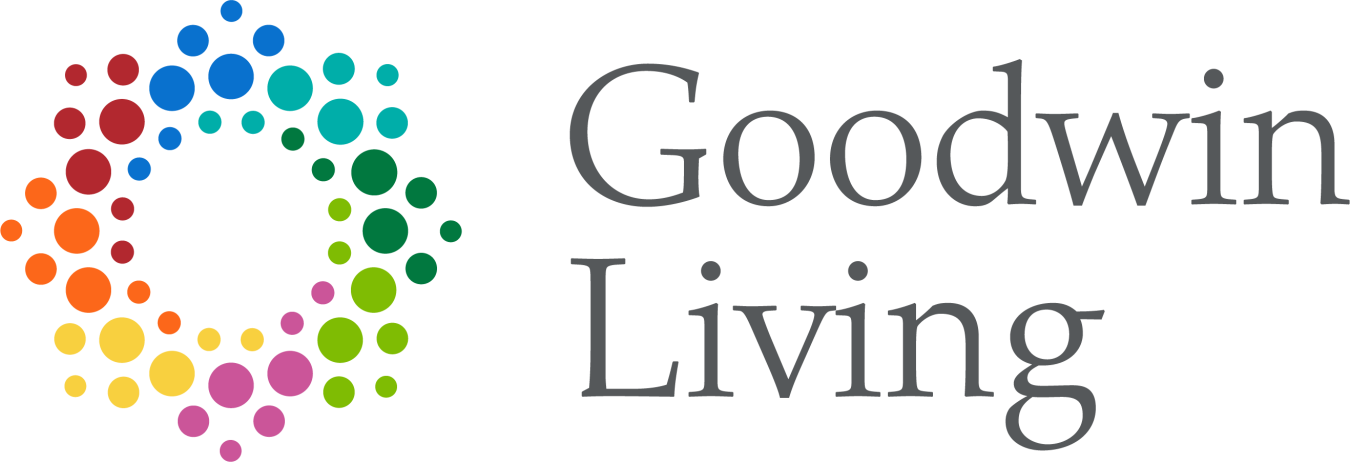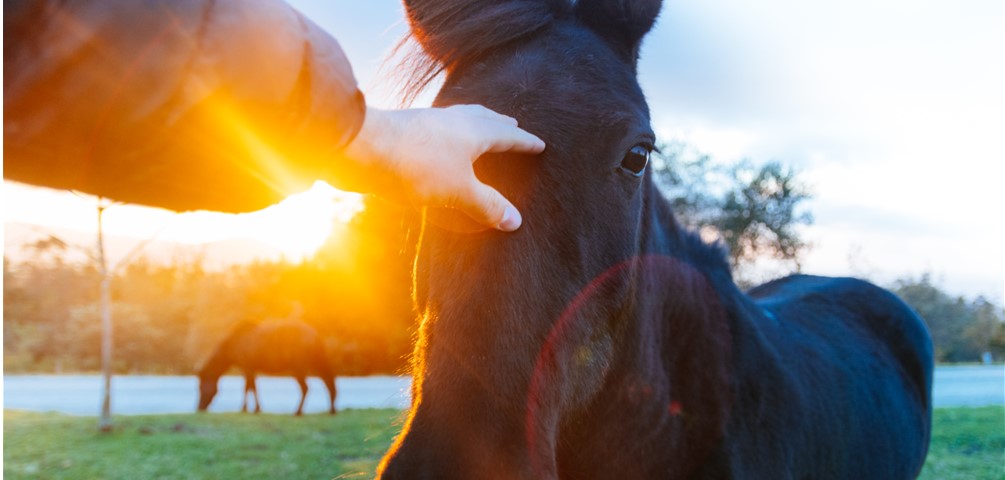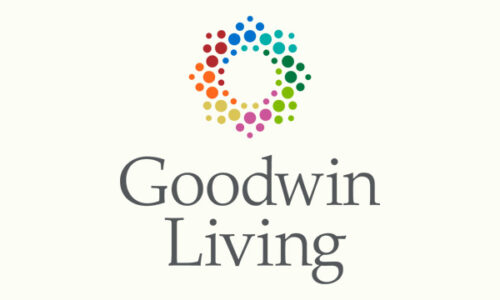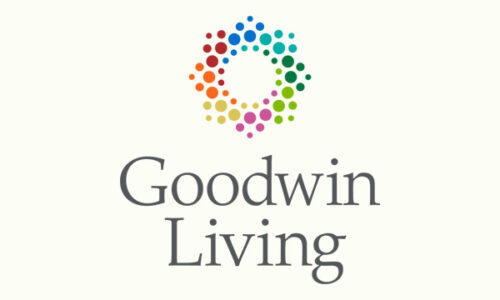June 27, 2022
Finding Engagement and Connection Through Horse Therapy
By Amanda Ranowsky
Editor’s Note: Although we refer to “horse therapy” throughout this article, the program offered to Goodwin Living residents is technically a non-therapy service known as equine-assisted learning. Program leaders are not licensed, professional therapists.
For Goodwin House Alexandria Social Worker Barbara Bolin, a personal passion leads to better outcomes for the residents she supports. She spearheads a horse therapy program that sparks engagement and connection for residents living with dementia, anxiety and other challenges.
Barbara is an animal lover and avid horsewoman. “I’ve had horses for a long time,” said Barbara. “Horses are sensitive. They’re almost clairvoyant; they can tell your mood. They have such mystique and charisma that even people who haven’t been around them before really enjoy the experience.”
As a social worker in one of the Goodwin Living Life Plan Communities, Barbara provides support to residents as they move through their daily lives and the stages of aging. This support could take the form of counseling, assisting with moves between levels of living and other life changes or providing resources.
Barbara’s passion for animals inspired her to organize visits of baby goats and other animals to residents at Goodwin Living campuses as far back as 2017, an activity that continues to this day. A chance encounter led her to another type of animal therapy – equine-assisted therapy.
Partnering with a Therapeutic Riding Center
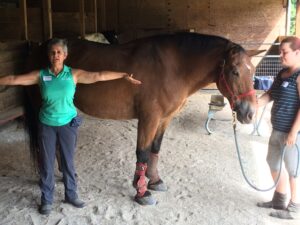
Barbara often rode her horse past Simple Changes Therapeutic Riding Center in Mason Neck, Virginia. There, she observed how they work with individuals with physical or mental disabilities, as well as those experiencing mental disorders or challenges. Simple Changes provides equine-assisted services and learning rather than therapy sessions, but the results can certainly be therapeutic!
“I reached out to see if we could arrange an equine-assisted learning program for residents at GHA,” said Barbara. “They had never done a program with older adults before. Their clientele is usually younger, but when I reached out to Corliss Wallingford, Executive Director of Simple Changes, she was very interested.”
Together, Barbara and Corliss developed a program geared toward older adults experiencing mental, emotional or behavioral challenges such as dementia, anxiety and depression. “It’s a chance for them to get out and succeed at something,” said Barbara. “It’s a chance for spontaneity, and a novelty for people to be able to travel 15 miles away and spend three hours in a very different setting, outdoors with living animals and other people.”
The Benefits of Animal Interactions
Research has shown many benefits of human-animal interactions, including benefits for older adults. Animal therapy and activities with animals have proven to reduce symptoms of depression and anxiety for older adults and improve social functioning of persons living with dementia. Equine therapy in particular can be used to treat behavioral problems, anxiety and depression and has been shown to improve the quality of life of older adults living with dementia.
“I had one resident who was non-verbal,” said Barbara. “She would often just sit, looking downward, nothing going on. The moment she saw the horses, she said, “They’re beautiful!” She opened her eyes wide. She reached for the horse. She petted it. She looked like a thrilled child.”
A Typical Horse Therapy Session
The sessions at Simple Changes are designed to help participants be in the moment and practice self-awareness, methods that other organizations have successfully used to help older adults living with dementia. The program provides benefits for those experiencing anxiety, depression, loneliness or behavioral issues as well. Not all participants have dementia.
Barbara’s horse therapy sessions begin with a 25-minute bus ride to the riding center. “We talk about horses along the way,” said Barbara. “We share little trivia such about where horses came from, how they evolved and so on. We might also try to sing a song from Rawhide or Gunsmoke or other shows that they remember. We chat about the horses and their past experience with horses.”
At the center, participants begin with introductions to one another and to the horses. They will do stretching and mindfulness activities to engage all five senses before moving on to the day’s lesson plan.
The activities are varied. “We might put everyone’s names—including the horses—in a basket and draw,” said Barbara. “Whoever’s name gets pulled, they get to talk about themselves for a few minutes, or if it’s one of the horses, we’ll tell them about the horse.”
Other times, the activity could be writing a poem or a story about the horses. “We’ll ask everyone to describe how they’re feeling around the horses,” said Barbara. “We want them to talk about how they feel and process it.”
Participants also interact directly with the horses. “We will brush the horses, take turns feeding all the horses a treat and pet the horses,” said Barbara “On our last trip, one of the residents got to help give the horse a bath, which was thrilling to him. He just had the best time.”
“Sometimes, especially when there are participants who are nervous around the horses, we’ll finger paint on the horse,” she shared. “It’s amazing to see the person forget they are afraid of the horse while they are painting on that fuzzy canvas. Afterwards, we admire the artwork and everybody talks about what they have drawn or written.”
To close out the day’s activities, the group comes back together to talk about what they’ve done that day. “We ask how they enjoyed it, and what they are going to remember about it,” said Barbara. “Part of our hope is that residents remember their last trip and get excited when they know that another trip is coming up.”
A Special Connection
Twice a year, residents have the option to participate in four-week sessions. Some join for a single “semester”. Others, like GHA resident Don Pepper, participate every time the program is offered.
Don has moved to GHA in 2018, and he has participated in the horse therapy program every semester it has been offered since 2019.
“He likes it because it enables him to get out from the Goodwin House campus,” his daughter, Kathleen Pepper, shared. “He doesn’t drive, so it gives him a chance to get out and do something different.”
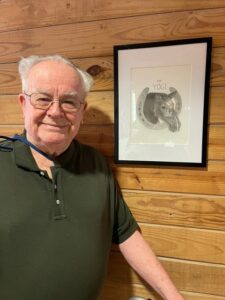
During his first year in the program, Don developed a special rapport with one of the horses. “He always liked going to see Yogi,” Kathleen shared. With permission from his doctor, Don was even able to ride Yogi on one visit.
“It happened to be one of the days that members of the Alexandria Police Department were there as volunteers, part of their dementia-friendly training,” said Barbara. “The officers served as side walkers for Don, leading Yogi as Don rode him. He got a police escort!”
Sadly, Yogi passed away in 2020, during a time when the horse therapy program was halted due to the pandemic.
While a resident at GHA, Don had been taking many art classes and was learning how to draw. He used these skills to create a small memorial of Yogi.
“He had a photo that he’d taken of Yogi and he used it as a reference to draw a picture of him,” shared Kathleen. “Around Yogi he drew a horseshoe and ‘RIP’, and the first session back once they reopened, he presented the drawing to Corliss.” Don’s drawing now hangs in the barn at Simple Changes.
“We were really proud of him for doing that,” said Barbara. “It meant a lot to him. And it meant a lot to them.”
Kathleen joined her father for one of the sessions and sings the praises of the horse therapy program. “You can visibly see the people who participate light up when they get the horses out,” she said. “Even if they didn’t have experience with horses or animals before, it triggers memories of what it’s like to interact, to be part of something.”
“I think everyone knows that animals are not judgmental,” she continued. “People feel safe being around them – they’re not worrying about what someone is going to say because they have a walker or whatever it is. I think that’s a real benefit to the program.”
Barbara agrees. “It’s just therapeutic to be around those animals. Who doesn’t want to pet a horse?”
One of Many Engaging Programs
The horse therapy program is one of many unique and engaging programs offered in the Goodwin Living Life Plan Communities that Barbara can recommend to residents. StrongerMemory (available to both residents and the general public) is an innovative brain health program that is designed to stimulate the part of the brain that helps retrieve memories. Music therapists provide residents the opportunity to fulfill lifelong dreams and develop new skills. Art classes, fitness classes and educational classes stimulate residents’ bodies, minds and creativity.
Amidst these varied offerings, the horse therapy program is one more tool for Barbara as she seeks to help residents live their best lives. “Our goals are to improve the quality of life and give residents more autonomy and engagement,” she said. “And it’s wonderful to see people be as thrilled as I am about horses!”
________________
As Marketing & Communications Specialist, Amanda Ranowsky partners with colleagues throughout Goodwin Living to tell our stories and raise brand awareness. From printed collateral to digital marketing, Amanda covers many bases. Before joining Goodwin Living, Amanda worked for a small, family-owned business where she gained experience in content marketing. Amanda’s creative expression extends beyond the office. She is an active member of community theater and chorus groups.
